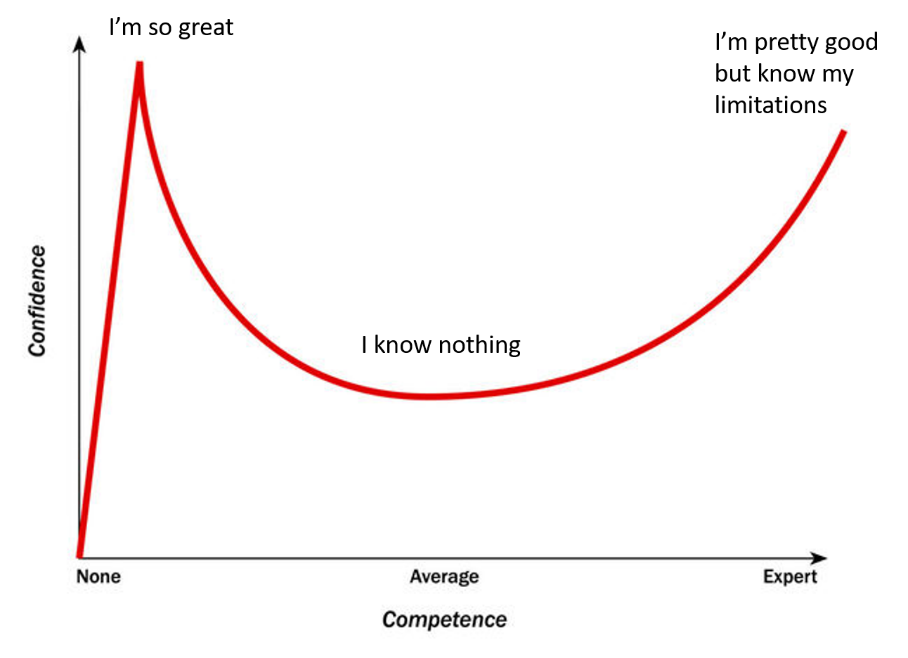
How to Manage Overconfident and Incompetent Employees
Create Job Description Using AI
Write appealing job descriptions for any job opening to attract the most qualifield and suitable candidates. FOR FREE.
try now
The Dunning-Kruger effect?
The Dunning-Kruger effect is someone’s cognitive bias to overestimate their own skills. Usually, they are arrogant and unable to recognize their colleagues’ talents and feeling superior to everyone else.
For example: Ali is a backend developer in your startup. It came to your knowledge that he committed a few mistakes and his colleagues stated that he’s been hard to work with. As a manager, you called Ali for a talk about what you’ve heard.
When you interviewed Ali and assessed his skills, you knew that he didn’t have the qualifications required, but had other great ones. So, all he needed is just some training. But he reacted very badly to your feedback stating that he is the best developer in the team and the others are jealous of his competence.
This is the Dunning-Kruger effect. Another thing to be pointed out is that someone with this sort of cognitive issue might be completely blinded by their lack of knowledge, making it more difficult for them to see their errors.

A graph displaying the Dunning-Kruger Effect. Notice the high confidence for the person with low competence. Source: Training Peaks
Dunning-Kruger's effect on startups
Besides being difficult to handle, what are other consequences of Dunning-Kruger's effect on organisations?
Hiring the most skilled people to support you build your startup is necessary to achieve success. Someone with a cognitive bias that disrupts their capacity to evaluate self-performance might not be helpful on this.
The effect of low-performers who don't accept rational criticism of their work can be very harmful to smaller teams. They bring too much negativity, discredit their colleagues' work, don’t believe in the organisation and undermine all collaboration.
When it comes to decision-makers, it can lead to destructive management, once they are not connected to reality or ignore subordinates specialists in their fields.
Managing the Dunning-Kruger effect
Appropriate feedback is essential to evaluate employees' performance. Managing a difficult employee can be hard, but there are some tips to handle this situation the best way:
How would you tell people, who are unable to recognize they don’t know something, that their performance is below average?
You don’t want to ruin this person's self-confidence, but to help them see the knowledge gap and show that it’s perfectly fine to learn and improve. Even though it can be hard, you must stay professional.
-
People with Dunning-Kruger effect symptoms don’t respond well to negative feedback, as they see themselves as experts, so don’t argue with them. Alternatively, propose a task that is clearly above their abilities and qualifications, making their lack of skill stand out. Making the situation clear is the best way to start.
-
Then, give them proper training on the subject they need to improve. It will help remove the knowledge gap and show them how things must be performed.
-
Let them know what great performance looks like. Don’t just point out when they are doing it wrong, but when another co-worker does it well.
-
Help them track progress with regular feedback, even employees in higher positions should receive feedback from their subordinates. There’s always room for improvement, no matter the experience.
The best feedback system
An excellent way to get feedback from subordinates is through an anonymous poll. You can ask questions ranging from soft skills, such as communication and hard skills,
As the Dunning-Kruger effect makes it harder for someone to listen to criticism, it will be easier for subordinates to express themselves and give an honest opinion, avoiding a tough situation.
Another method is the 360-degree feedback, which includes the employee’s self-evaluation, as well as supervisor, manager, co-workers, and subordinates’. The aim of this method is to collect feedback from every point of view and from different sources.
If you want to create more employee engagement, you can go with the Individual Development Plan (IDP), with:
- Clear goals,
- Aligned expectations, and
- Better standards for evaluation.
Keep in mind you are a manager, not a therapist, so if the situation is too complex to handle in the workplace, maybe they need professional help. Employee termination could be the only solution if they still refuse to cooperate.
Source: MyCTOFriend
Would you like to learn more about AJobThing?
Articles you might be interested in
The 4 Types of Paid Leaves in Malaysia
HR Guide: Procedure and Templates for Leave Administration
Your Employee is Absent or Late Again! What Should You Do?





